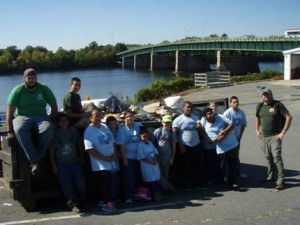
The 410+ mile long Connecticut River and nearby rivers and streams are cleaner of trash thanks to thousands of hard working volunteers. On Friday and Saturday, Sept. 26 and 27, volunteers from businesses, faith communities, watershed groups, schools, community and youth organizations grabbed trash bags and work gloves for the 18th annual Source to Sea Cleanup, organized by the Connecticut River Watershed Council (CRWC). The Source to Sea Cleanup is a two-day collaborative trash clean-up event in all four states of the Connecticut River basin (NH, VT, MA, CT).
“While removing trash is important, the Source to Sea Cleanup is about more than that,” says Jacqueline Talbot, CRWC’s Cleanup Coordinator. “The Cleanup is about strengthening community and allowing people to take meaningful action to improve their neighborhoods. When people help clean their rivers, they make connections with each other and their rivers. Those connections have benefits lasting well beyond the Cleanup.”
Final numbers are still being tallied, but it’s estimated that 2,000-2,300 volunteers participated in this year’s Source to Sea Cleanup, cleaning rivers from near the Canadian border down to the mouth of the Connecticut River in Old Lyme, CT. On average, 50 tons of trash is removed from in and near our rivers every year.
At Sumner Falls on the Connecticut River in NH and VT, volunteers from Hypertherm and King Arthur Flour hauled dozens of tires from the river, including one 8’ tall tractor tire that required an hour of work to get ashore.
In Deerfield and Holyoke, MA and in Wethersfield, CT the US Fish & Wildlife Service used an airboat, a landing craft, a john boat, and their research boat along with the elbow grease of eight employees to help get at debris along sites only accessible by boat. This work helped remove over 50 tires, a washing machine, shopping carts, and thousands of single-use beverage containers from high quality habitat areas including around an active eagle’s nest.
At the Pioneer Valley Riverfront Club in Springfield, MA volunteers from Covanta Energy, United Water, local boy scouts, and community members filled a dumpster in just a few hours. They found and cleaned up a plastic bottle dump that included hundreds of non-redeemable, single-use plastic bottles.
At this year’s southernmost cleanup in Old Lyme, CT, DEEP Marine Fisheries, the Coast Guard Auxiliary 25-05 and community volunteers in waders spanned the marshes near the river’s mouth. They removed trash that is washed down from the 400+ miles above them, including dozens of plastic bottles, hundreds of Styrofoam pieces, televisions and tires. “From the water the marshes can look deceptively clean” says Talbot. “When you get an up-close look at this last stop before Long Island Sound, you see we are locally addressing a problem with regional and global implications.”
This year, CRWC is also using the Source to Sea Cleanup to support solutions to river waste. “Each year we find thousands of single-use bottles and hundreds of tires in and near our rivers,” notes Talbot. “Eventually, this trash becomes part of the large ocean garbage patches that harm wildlife. We will use the data collected during the Source to Sea Cleanup to help inform policies and practices that will get bottle and tire waste out of our rivers,” continues Talbot. “Healthy rivers are so important because they contribute so much, both to our economies and the beauty and enjoyment of our communities.”
Initiatives such as increasing access and ease of curb side recycling, expanding existing recycling efforts to process all varieties of materials, and extending the responsibility of recycling to manufacturers are essential to the success of zero waste programs. Given what’s found in our rivers every year, CRWC would like to see existing bottle bills be expanded to include all single-use beverage containers, banning or establishing pay-per-use plastic bags, and legislation allowing for free tire disposal. “We all have a responsibility to solve this problem—individuals, manufacturers, businesses, and government,” says Andrew Fisk, CRWC Executive Director. “Lead sponsors NRG Middletown and TransCanada’s financial support enables us to continue growing the Source to Sea Cleanup so that it has an impact beyond the two days of cleanup.”
The CRWC works to protect the watershed from source to sea. As stewards of this heritage, we celebrate our four-state treasure and collaborate, educate, organize, restore and intervene to preserve its health for generations to come. Our work informs our vision of economic and ecological abundance. To learn more about CRWC, or to make a contribution to help protect the Connecticut River, visit www.ctriver.org or call 413-772-2020, ext. 201.